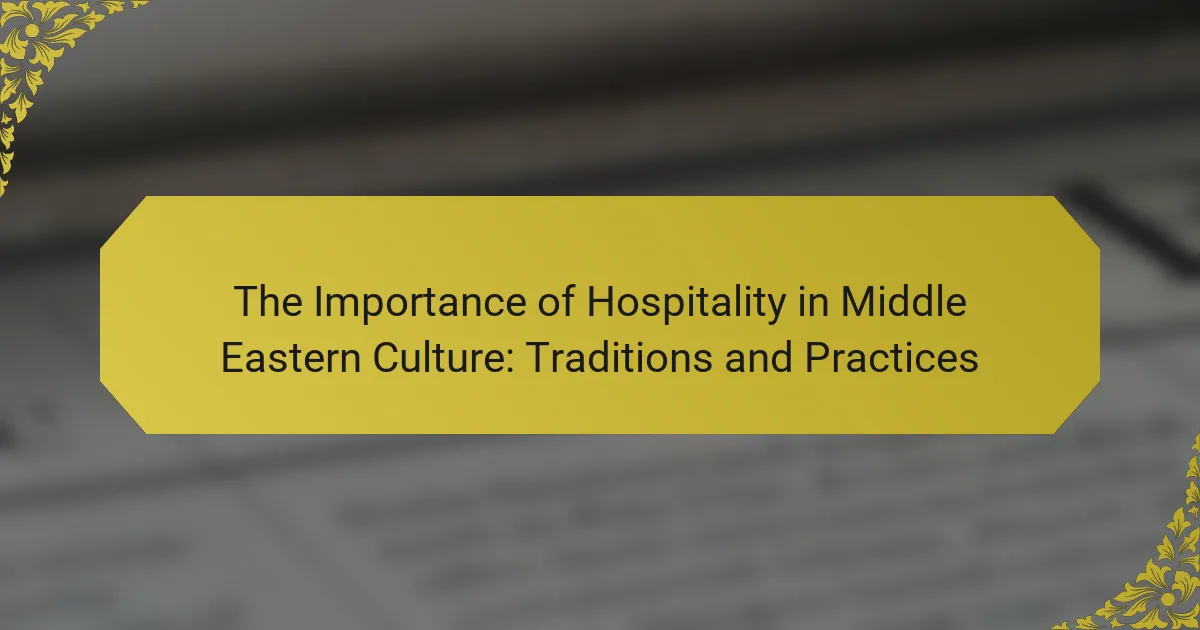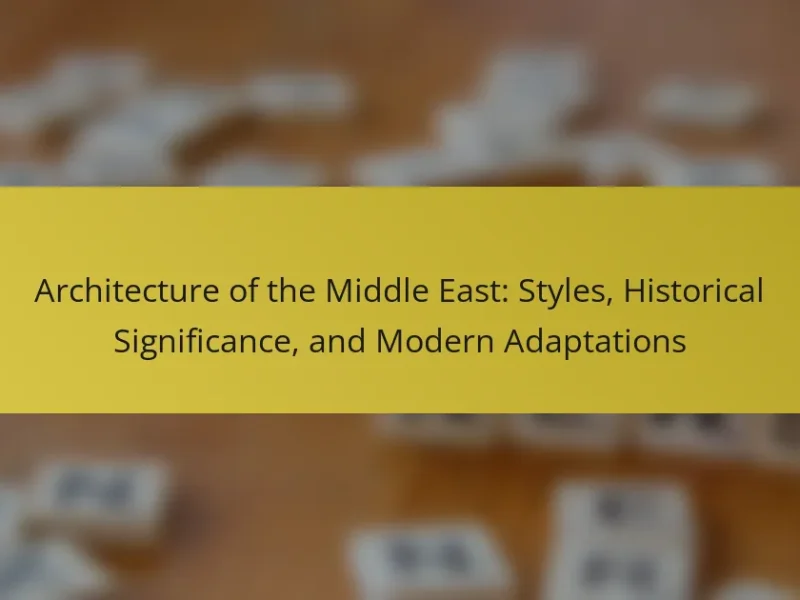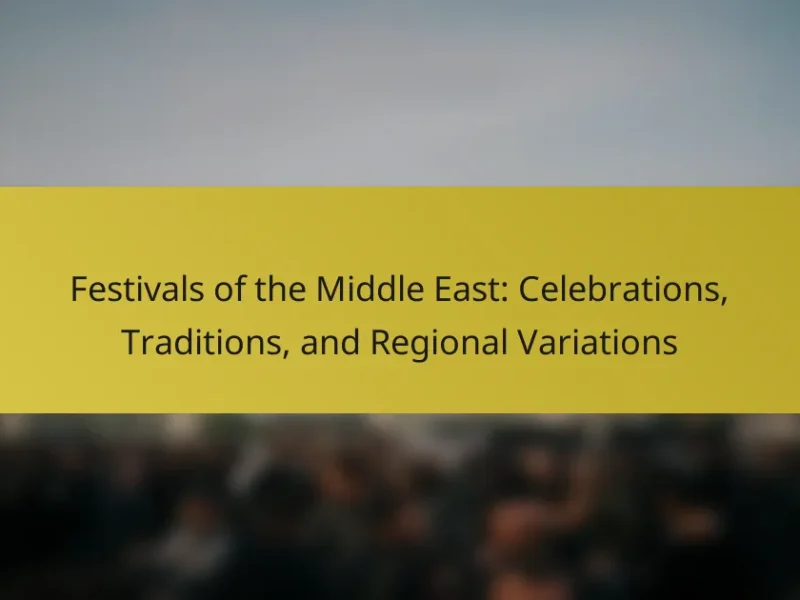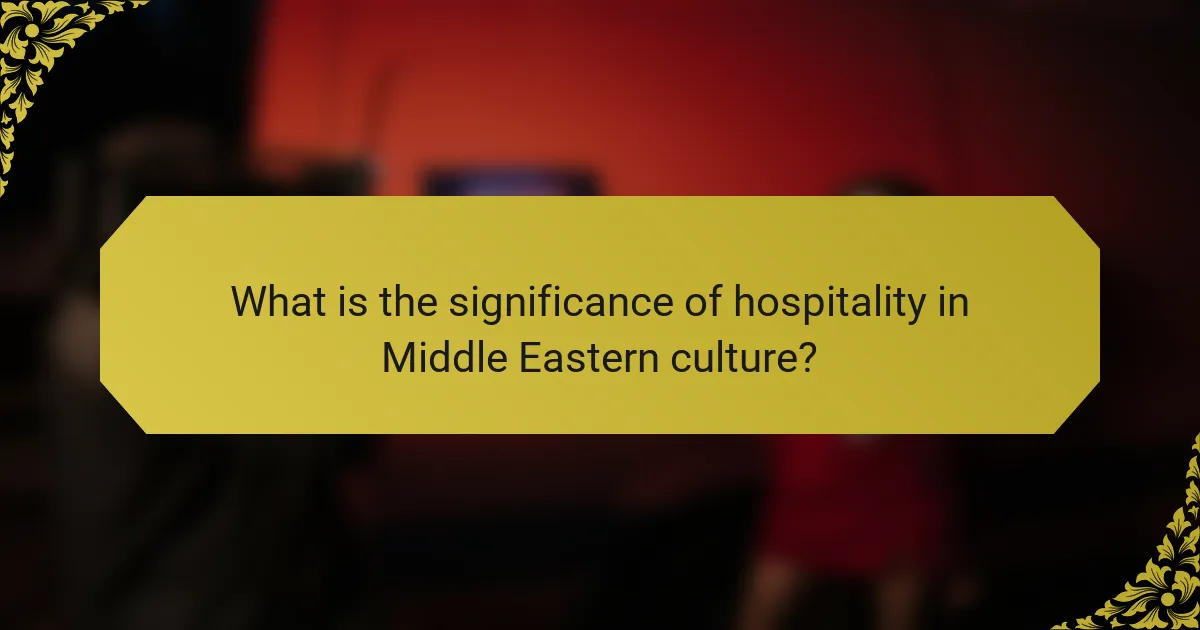
What is the significance of hospitality in Middle Eastern culture?
Hospitality is a cornerstone of Middle Eastern culture. It reflects deep-rooted traditions and social values. In many Middle Eastern societies, welcoming guests is seen as a moral obligation. This practice fosters community bonds and strengthens relationships. Offering food and drink symbolizes generosity and respect. Guests are treated with utmost honor, often receiving the best available resources. Historical accounts show that hospitality has been essential for trade and diplomacy. The significance of hospitality is evident in local customs and ceremonies. It plays a crucial role in cultural identity and heritage.
How is hospitality defined within Middle Eastern traditions?
Hospitality in Middle Eastern traditions is defined as a profound cultural value emphasizing generosity and warmth towards guests. It is deeply rooted in historical practices and social norms. Middle Eastern societies view hospitality as a sacred duty, often extending beyond mere politeness. Guests are treated with utmost respect, and their comfort is prioritized. Traditional practices include offering food, drink, and shelter. In many cultures, refusing hospitality can be seen as an insult. This tradition is supported by religious teachings, such as those found in the Quran, which encourage kindness to strangers. Overall, hospitality reflects the community’s values and identity.
What are the historical roots of hospitality practices in the region?
Hospitality practices in the Middle East have deep historical roots, tracing back to ancient civilizations. The region’s arid climate necessitated communal support and sharing of resources. Nomadic tribes relied on hospitality for survival during long journeys. Religious texts, such as the Quran, emphasize the importance of welcoming guests. Bedouin culture has long celebrated hospitality as a core value. Historical accounts show that offering food and shelter was a sign of honor. Trade routes facilitated cultural exchanges, enhancing hospitality traditions. These practices have evolved but remain central to Middle Eastern identity today.
How do cultural beliefs influence the concept of hospitality?
Cultural beliefs significantly shape the concept of hospitality. In many Middle Eastern cultures, hospitality is viewed as a sacred duty. It reflects values such as generosity, respect, and community. For instance, offering food and drink to guests is a common practice. This act symbolizes goodwill and social connection. According to anthropologist Edward Hall, cultures with high-context communication prioritize relationships, making hospitality essential. Additionally, Islamic teachings emphasize welcoming guests, reinforcing the importance of hospitality in daily life. Thus, cultural beliefs create a framework that elevates hospitality to a vital social norm in Middle Eastern societies.
Why is hospitality considered a core value in Middle Eastern societies?
Hospitality is considered a core value in Middle Eastern societies due to cultural, historical, and religious influences. It reflects the deep-rooted tradition of welcoming guests and offering generous support. In many Middle Eastern cultures, hospitality is seen as a moral obligation. This practice is often linked to Bedouin traditions, where sharing food and shelter was essential for survival in harsh environments. Additionally, Islamic teachings emphasize the importance of treating guests with respect and kindness. For instance, the Quran encourages believers to be generous and hospitable. This cultural norm fosters community bonds and social cohesion, reinforcing the significance of hospitality in everyday life.
What role does hospitality play in social relationships?
Hospitality is essential in fostering social relationships. It creates a sense of belonging and strengthens bonds among individuals. In Middle Eastern culture, hospitality is a deeply rooted tradition. It reflects respect and generosity towards guests. This practice enhances community ties and promotes social cohesion. Research shows that hospitable interactions lead to increased trust and reciprocity among people. Furthermore, hospitality can facilitate networking and collaboration in social settings. Overall, it plays a vital role in nurturing interpersonal connections.
How does hospitality reflect cultural identity and pride?
Hospitality reflects cultural identity and pride by showcasing traditional values and communal bonds. In Middle Eastern culture, hospitality is deeply rooted in social customs. It is a symbol of generosity and respect for guests. Welcoming guests with food and drink signifies cultural warmth. Each region has unique hospitality practices that highlight local traditions. For example, serving Arabic coffee is a customary gesture of welcome. This practice illustrates the importance of sharing and community. The emphasis on hospitality reinforces social ties and cultural heritage. In essence, hospitality serves as a reflection of identity and pride within the community.
What are the common traditions associated with hospitality in the Middle East?
Common traditions associated with hospitality in the Middle East include offering food and drink to guests. This act symbolizes generosity and respect. Guests are often greeted warmly and invited to sit, reflecting the importance of comfort. Traditional beverages like coffee or tea are usually served first. Meals often feature local dishes, showcasing regional cuisine. Sharing food is a communal experience, reinforcing social bonds. In many cultures, refusing hospitality can be considered rude. Additionally, the practice of welcoming guests extends to offering shelter and assistance. These traditions highlight the deep-rooted cultural values of generosity and community in the Middle East.
What rituals are involved in welcoming guests?
Rituals involved in welcoming guests in Middle Eastern culture include greeting, offering refreshments, and sharing meals. The host typically greets guests warmly at the entrance. This initial greeting sets a tone of respect and hospitality. Offering refreshments, such as coffee or tea, is a common practice. These beverages symbolize warmth and generosity. Sharing a meal is a vital aspect of the welcome ritual. Meals are often elaborate, showcasing the host’s culinary skills. Traditional dishes may vary by region, but the act of sharing food is universal. These rituals reinforce social bonds and demonstrate the significance of hospitality in Middle Eastern culture.
How do food and drink play a role in hospitality practices?
Food and drink are central to hospitality practices in Middle Eastern culture. They symbolize generosity and welcome. Serving meals to guests reflects respect and honor. Traditional dishes often represent cultural heritage and identity. Sharing food fosters connections among people. Beverages, like coffee and tea, are integral to social interactions. They often precede meals and signify hospitality. According to research by the International Journal of Hospitality Management, food and drink enhance guest satisfaction and cultural experience.

How do different countries in the Middle East express hospitality?
Different countries in the Middle East express hospitality through unique traditions and practices. In Saudi Arabia, guests are welcomed with coffee and dates, symbolizing generosity. In Lebanon, sharing a meal is a key aspect of hospitality, often featuring multiple courses. The United Arab Emirates emphasizes lavish gatherings, where guests are treated to extravagant feasts. In Jordan, hospitality includes offering a warm welcome and ensuring guests’ comfort throughout their stay. In Oman, the tradition of serving kahwa, a spiced coffee, showcases the importance of hospitality. Each country reflects its cultural values through these practices, highlighting the significance of welcoming guests.
What unique hospitality customs exist in various Middle Eastern nations?
In various Middle Eastern nations, unique hospitality customs include the serving of coffee and dates, which symbolize welcome and generosity. In Saudi Arabia, guests are often greeted with Arabic coffee, known as “qahwa,” served in small cups. This ritual emphasizes respect and honor towards visitors. In Bedouin culture, offering food and drink is essential, reflecting the value placed on hospitality. In Lebanon, a common practice is to serve a large array of dishes, showcasing abundance and warmth. In Jordan, the phrase “Ahlan wa sahlan” is frequently used to express hospitality, translating to “welcome.” In Iran, guests may be presented with sweets and tea, highlighting the importance of sweetness in relationships. Each of these customs illustrates the deep-rooted traditions of hospitality in Middle Eastern cultures, emphasizing generosity and respect for guests.
How does hospitality differ between urban and rural settings?
Hospitality differs significantly between urban and rural settings. In urban areas, hospitality often emphasizes efficiency and speed. Services are typically more formal and structured, catering to a diverse clientele. Urban hospitality venues may prioritize quick service to accommodate busy lifestyles.
In contrast, rural hospitality focuses on warmth and personal connections. Guests often experience a more relaxed atmosphere. Rural hosts may offer home-cooked meals and engage in longer conversations. This setting fosters a sense of community and belonging.
Statistical data shows that rural hospitality often results in higher guest satisfaction ratings. A study from the Journal of Hospitality Research highlights that personal interactions in rural settings lead to memorable experiences. Urban hospitality, while efficient, may lack the personal touch found in rural areas.
What are some notable regional variations in hospitality practices?
Hospitality practices vary significantly across different regions. In the Middle East, for example, guests are often welcomed with coffee and dates as a traditional gesture. This practice symbolizes respect and generosity. In contrast, in Western cultures, hospitality may focus more on formal dining experiences. In Asian cultures, hospitality often includes the concept of “saving face,” where hosts go to great lengths to ensure guests feel comfortable. Each region’s unique customs reflect its cultural values and social norms. These variations highlight the diverse expressions of hospitality worldwide.
How do modern influences shape traditional hospitality practices?
Modern influences shape traditional hospitality practices by integrating contemporary values and technologies. Social media platforms promote instant communication and sharing of experiences. This encourages hospitality providers to enhance customer engagement and feedback. Globalization introduces diverse culinary options and service styles into traditional settings. Cultural exchange leads to a blending of local and international hospitality standards. Sustainability trends prompt traditional practices to adopt eco-friendly approaches. Additionally, technological advancements streamline operations and improve guest experiences. For instance, mobile apps facilitate reservations and personalized services, aligning with modern consumer expectations.
What impact does globalization have on hospitality customs?
Globalization significantly impacts hospitality customs by blending diverse cultural practices. It encourages the adoption of international standards in service quality and guest experience. For instance, global hotel chains implement uniform training programs for staff across different countries. This leads to a more standardized approach to hospitality.
Moreover, globalization facilitates cultural exchange, allowing local customs to be shared and appreciated worldwide. Middle Eastern hospitality, known for its warmth and generosity, gains visibility through international tourism. This exposure can enhance the understanding of traditional practices among global travelers.
Statistics show that international tourism in the Middle East has increased by over 10% annually in recent years. This rise leads to a greater appreciation for local customs, as visitors seek authentic experiences. Consequently, hospitality providers adapt their offerings to meet the expectations of a diverse clientele while maintaining cultural integrity.
How are traditional practices being preserved in contemporary society?
Traditional practices are being preserved in contemporary society through cultural education and community initiatives. Educational programs in schools incorporate traditional customs and values. Local communities host festivals that celebrate heritage and traditional practices. Social media platforms are used to share and promote these traditions widely. Families pass down practices through storytelling and participation in rituals. Government policies support cultural preservation through funding and resources. Museums and cultural centers provide spaces for showcasing traditional art and practices. These efforts ensure that traditional practices remain relevant and practiced in modern contexts.
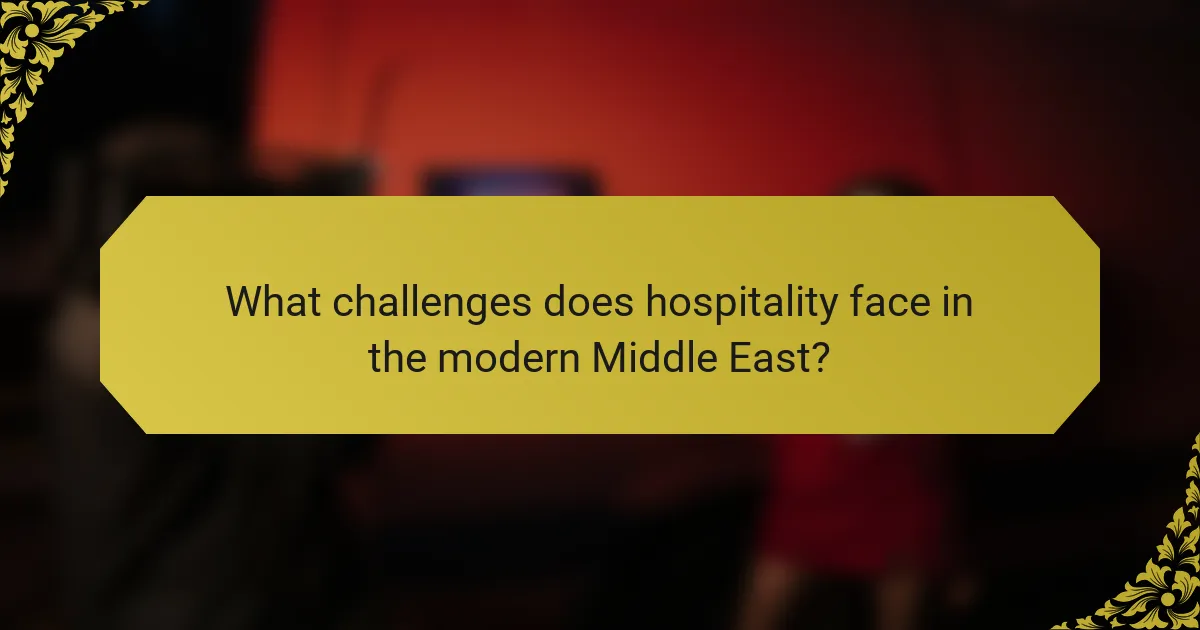
What challenges does hospitality face in the modern Middle East?
The hospitality sector in the modern Middle East faces several challenges. Political instability affects tourism, a key revenue source. Economic fluctuations impact consumer spending on hospitality services. Cultural diversity creates a need for tailored services to meet varying expectations. Additionally, competition from global hospitality brands pressures local businesses. The COVID-19 pandemic significantly disrupted operations and reduced travel. Labor shortages also pose a challenge, as skilled workers are needed to maintain service quality. Adapting to technological advancements is essential for enhancing guest experiences. Environmental sustainability concerns are increasingly relevant, requiring eco-friendly practices in hospitality operations.
What are the social and economic factors affecting hospitality today?
Social and economic factors affecting hospitality today include changing consumer preferences, economic fluctuations, and technological advancements. Consumers increasingly seek personalized experiences, influencing service delivery. Economic downturns can reduce travel and dining budgets, impacting hospitality revenues. Additionally, the rise of online booking platforms has transformed how consumers access services. Labor shortages in the hospitality sector also affect service quality and operational efficiency. These factors collectively shape the current landscape of the hospitality industry.
How do political issues influence hospitality practices in the region?
Political issues significantly influence hospitality practices in the Middle East. For instance, regional conflicts can lead to heightened security measures in hotels and restaurants. These security measures may reduce guest capacity or alter service protocols. Additionally, political stability impacts tourism, which is vital for hospitality businesses. A decline in tourism due to political unrest can result in reduced revenue for hospitality establishments. Conversely, political initiatives promoting tourism can enhance hospitality services and attract more visitors. Economic sanctions imposed on a country can also affect the availability of resources for hospitality operations. Overall, the interplay between political dynamics and hospitality practices shapes the customer experience in the region.
What role does tourism play in shaping hospitality trends?
Tourism significantly influences hospitality trends by driving demand for diverse services and experiences. As tourist preferences evolve, hospitality providers adapt to meet these expectations. Increased travel leads to a rise in unique accommodations, such as boutique hotels and eco-friendly lodges.
In the Middle East, tourism has prompted a focus on cultural authenticity in hospitality. This includes traditional dining experiences and local entertainment options. Statistics show that regions with high tourist traffic often see a 20% increase in hospitality service innovation.
Furthermore, tourism encourages investment in infrastructure, enhancing overall guest experiences. For example, improved transportation links and modern amenities attract more visitors. Consequently, hospitality trends continuously evolve to reflect the dynamic nature of tourism.
How can individuals enhance their understanding and practice of hospitality?
Individuals can enhance their understanding and practice of hospitality by immersing themselves in cultural traditions. Engaging with local communities allows for firsthand experience of hospitality practices. Participating in cultural events or festivals showcases traditional hospitality rituals. Studying historical texts about hospitality in Middle Eastern cultures provides context and depth. Learning from experienced hosts through mentorship can refine practical skills. Additionally, reading scholarly articles on hospitality enhances theoretical knowledge. Research indicates that cultural immersion significantly improves hospitality understanding (Source: “Cultural Competence in Hospitality” by Smith & Johnson, Journal of Hospitality Research).
What tips can be adopted for showing hospitality in a Middle Eastern context?
To show hospitality in a Middle Eastern context, offer food and drinks to guests immediately upon arrival. Traditional beverages like Arabic coffee or tea should be served. Always greet guests warmly, often with a handshake or kiss on the cheek. Respect for elders is crucial, so honor senior guests first. It is customary to provide ample seating, ensuring comfort for all. Guests should be encouraged to partake in meals, as sharing food is a sign of hospitality. Personal touches, such as asking about the guest’s well-being, enhance the experience. Lastly, follow up with a thank you message after the visit to reinforce the bond.
How can one respect cultural nuances in hospitality practices?
To respect cultural nuances in hospitality practices, one should understand and acknowledge local customs. Different cultures have unique traditions regarding greetings, dining, and guest treatment. In Middle Eastern hospitality, for example, offering food and drink is a common practice. Refusing such offerings can be seen as disrespectful.
Additionally, understanding the significance of gestures is crucial. For instance, using the right hand for giving and receiving is important in many Middle Eastern cultures. Eye contact and body language also convey respect.
Moreover, being aware of dietary restrictions is essential. Many individuals may have specific dietary laws, such as halal requirements. Respecting these practices fosters a welcoming environment.
Finally, taking the time to learn basic phrases in the local language can enhance communication. This effort demonstrates respect for the culture and its people.
The main entity of the article is hospitality in Middle Eastern culture, which serves as a fundamental aspect reflecting deep-rooted traditions and social values. The article explores the significance of hospitality, defining it as a moral obligation that fosters community bonds and strengthens relationships through acts of generosity and respect. It highlights historical roots, cultural beliefs, and the role of hospitality in social relationships, as well as common traditions and rituals associated with welcoming guests. Additionally, the article addresses regional variations, modern influences, challenges faced by the hospitality sector, and practical tips for enhancing hospitality practices in a Middle Eastern context.
